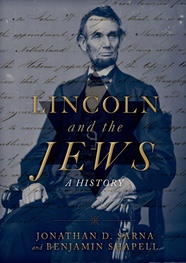The President Who Interacted with Jews, Represented Jews, Befriended Jews, Admired Jews, Commissioned Jews, Trusted Jews, and Defended Jews

A February 27th rally by hundreds of American Muslims in Oklahoma City was interrupted by protesters proclaiming the United States to be a Christian nation. Republican Representative John Bennett of Oklahoma was quoted as having described Islam as “a cancer in our nation that needs to be cut out.”
 One-hundred-fifty years earlier, a
different religious group fell victim to the same kind of protests.
That religion, like Islam today, had grown exponentially in a short
period of time. There were scarcely 3000 of them, mostly confined to
a few east-coast port cities, in 1820, but by 1865 they numbered over
150,000 and were spread out across the entire country. Being, for the
most part, foreign immigrants, they were viewed, like so many Muslim
immigrants are today, as dangerous, unscrupulous, unassimilable, and
antithetical to America’s Christian way of life.
One-hundred-fifty years earlier, a
different religious group fell victim to the same kind of protests.
That religion, like Islam today, had grown exponentially in a short
period of time. There were scarcely 3000 of them, mostly confined to
a few east-coast port cities, in 1820, but by 1865 they numbered over
150,000 and were spread out across the entire country. Being, for the
most part, foreign immigrants, they were viewed, like so many Muslim
immigrants are today, as dangerous, unscrupulous, unassimilable, and
antithetical to America’s Christian way of life.
The religious group reviled in the 1860s were Jews, described in more polite circles as “Hebrews” or “Israelites.” President James Buchanan was privately contemptuous of them. President Andrew Johnson openly impugned them, labeling one “a miserable little cuss—a contemptible Jew,” and Jews as a whole as members of “that tribe that parted the garments of our Savior.”
However, the president who came between Buchanan and Johnson -- Abraham Lincoln -- was different. He stood out among his contemporaries in befriending Jews. He worked to broaden America so that Jews might gain greater acceptance as equals nationwide.
Lincoln, more than any previous American president, consorted with a wide range of Jewish friends and acquaintances – over 100 according to one count – some of whom, like Abraham Jonas and Issachar Zacharie, he came to know well. This likely shaped his view of Jews. “When birds of different feathers flock together,” political scientist Robert Putnam has observed, “they come to trust one another.”
Lincoln’s association with Jews likely explains why, early in his presidency, he personally intervened to amend the military law, which restricted the chaplaincy to “regularly ordained ministers of some Christian denomination.” When the regularly ordained Rev. Dr. Arnold Fischel was rejected, since he was a Jew and not a Christian, he personally traveled to Washington to lobby Lincoln for a change in the discriminatory law. Lincoln, according to Fischel, “fully admitted the justice of my remarks” and agreed “that something ought to be done to meet this case.” Lincoln promised to “try to have a new law broad enough to cover what is desired by … the Israelites.” Making ample use of his prodigious political skills, Lincoln then helped to craft a law that construed the word “Christian” to mean “religious,” and, probably because he concealed that law within a larger bill that raised the salaries of popular generals, it sailed through Congress. Forthwith, he appointed the first Jewish chaplain to the armed forces, Jacob Frankel. This represented a major political victory for the Jewish community, a stinging defeat for the advocates of a “Christian America,” and a landmark in the legal recognition of America’s non-Christian faiths.
Lincoln likewise appointed numerous other Jews to positions of authority, especially as the Civil War progressed. Remarkably, he justified one such appointment with the statement, “We have not yet appointed a Hebrew,” a sign that he had made the inclusion of Jews a priority.
Lincoln once again acted on behalf of Jews when General Ulysses S. Grant, on December 17, 1862, issued his infamous General Orders No. 11, expelling “Jews as a class” from his war zone in response to allegations of smuggling. Lincoln personally revoked that order as soon as he learned of it. “To condemn a class,” he explained, employing language that is as timely today as it was then, “is, to say the least, to wrong the good with the bad. I do not like to hear a class or nationality condemned on account of a few sinners.”
Lincoln even subtly changed his personal rhetoric in response to Jewish sensitivities. Early on, and as late as 1862, he reflexively described America in Christian terms and, like the Oklahoma protesters of our day, characterized Americans as a “Christian people.” As president, however, Lincoln increasingly took note of the presence of non-Christians in the United States. His Gettysburg Address and deeply religious second inaugural bespoke a conscious effort to redefine America through phrases like “this nation under God” that embraced Jews and other non-Christians as insiders.
As Benjamin Shapell and I show in our new book, Lincoln and the Jews: A History, over the course of his tragically foreshortened life, Abraham Lincoln interacted with Jews, represented Jews, befriended Jews, admired Jews, commissioned Jews, trusted Jews, defended Jews, pardoned Jews, took advice from Jews, gave jobs to Jews, extended rights to Jews, revoked an expulsion of Jews, and even chose a Jew as his confidential agent. His rhetoric and actions exemplified for Americans what it meant to embrace Jews as trusted insiders.
Someday, one hopes, Muslim Americans will be embraced as trusted insiders as well.